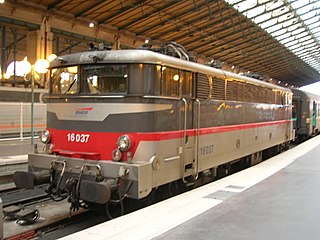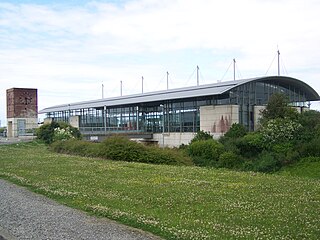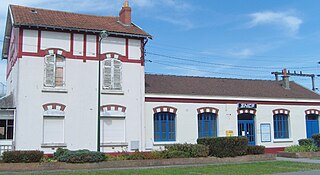
Ascq station (French: Gare d'Ascq) is a railway station serving the former village of Ascq, now part of Villeneuve-d'Ascq city, Nord department, northern France.

Ascq station (French: Gare d'Ascq) is a railway station serving the former village of Ascq, now part of Villeneuve-d'Ascq city, Nord department, northern France.
In the nineteenth century the Industrial Revolution developed industry in northern France. Ascq was linked to Lille with the construction of the railway station in 1865, and in 1885 to Roubaix.
During the Second World War, numerous trains went through Ascq and members of the resistance regularly committed acts of sabotage. On 1 April 1944, after such an act of sabotage, the Nazis killed 86 men. This event is known as the Ascq massacre.

In the late 1990s, before the construction of a new Belgian high-speed railway line, Eurostar and Thalys trains going to Belgium went through Ascq station.
The station is served by regional trains to Lille and Tournai (Belgium), and buses to Orchies. [1] Ilévia bus lines 13 and 73 serve the station. [2]
| Preceding station | TER Hauts-de-France | Following station | ||
|---|---|---|---|---|
| Annappes towards Lille-Flandres | Proxi P81 | Baisieux towards Tournai | ||
The railway station hosts a little train museum in the trains garage (halle aux trains) animated by the AAATV association. It houses a steam locomotive 141 TC 51 and an electric locomotive BB 12004 restored among many other train materials. [3]

The SNCF BB 16500s were a class of SNCF electric locomotives operating at a supply voltage of 25 kV single-phase 50 Hz AC.

The SNCF BB 16000 are a class of 25 kV 50 Hz AC electric locomotives produced by MTE. They are the AC version of the BB 9200.

Calais-Fréthun station is an SNCF international railway station in the suburbs of Calais, France. It is one of four stations serving the town; the others are Calais-Ville in the town centre, Fontinettes in the suburbs, and Beau Marais in the suburbs.

Creil is the railway station serving the northern French city of Creil. It is an important railway junction, situated on the Paris–Lille railway, the Creil–Jeumont railway and the branch lines to Beauvais and Pontoise.

Calais-Ville station is a railway station in the city centre of Calais, France.

Lille-Flandres station is the main railway station of Lille, capital of French Flanders. It is a terminus for SNCF Intercity and regional trains. It opened in 1842 as the Gare de Lille, but was renamed in 1993 when Lille Europe station opened. There is a 500 metres (1,600 ft) walking distance between the two stations, which are also adjacent stops on one of the lines of the Lille Metro.

Lille-Europe station is a SNCF railway station in Lille, France, on the LGV Nord high-speed railway. The station is primarily used for international Eurostar and long-distance SNCF TGV services, although some high-speed regional trains also call at the station. The station was built in 1993 to be used as a through station for trains between the UK, Belgium, and the Netherlands, as well as French TGV services, except those coming from Paris, which normally terminate at Lille-Flandres station. There is a 400-metre (1,300 ft) walking distance between the two stations, which are also connected by the Lille Metro and Lille tramway.

Amiens station is the main railway station for the Northern French city of Amiens.

Tournai railway station is a railway station in Tournai, Hainaut, Belgium, situated on railway line 94. It is operated by the National Railway Company of Belgium (SNCB/NMBS).

Ascq is a former commune on the Marque river in the Nord department in northern France, at seven kilometers from Belgium. Agricultural village until the Industrial Revolution, the former independent commune merged with others to become a district of the new town planned community of Villeneuve-d'Ascq since 1970. The operatic bass Louis-Henri Obin (1820–1895) was born in Ascq.

The Persan–Beaumont station is a railway station in Persan, France, near Beaumont-sur-Oise. It is at the junction of the Épinay-Villetaneuse–Le Tréport-Mers railway and the Pierrelaye–Creil railway. The station is served by trains of the Transilien line H and the TER Hauts-de-France.

Abbeville is a railway station serving the town of Abbeville, Somme department, in Hauts-de-France, northern France. It is on the Longueau–Boulogne railway and is the terminus of the Abbeville–Eu railway. It is served principally by TER Hauts-de-France trains.

Roubaix station is a railway station serving the town Roubaix, Nord department, northern France.

Tourcoing station is a railway station serving the town Tourcoing, Nord department, northern France.

Dunkirk station is a railway station serving the town Dunkirk, Nord department, northern France. This part of French Flanders is near West Flanders in Belgium.

Brive-la-Gaillarde is a railway station serving the town of Brive-la-Gaillarde, Nouvelle-Aquitaine, France. The station opened on 17 September 1860 and is located on the Orléans–Montauban railway, Coutras–Tulle railway, Brive-Toulouse railway and Nexon-Brive railway.

Hazebrouck station is a railway station serving the town of Hazebrouck, Nord department, northern France. This part of French Flanders is near West Flanders in Belgium.

Béthune station is a railway station serving the town Béthune, Pas-de-Calais department, northern France. It is situated on the Arras–Dunkirk railway and the Fives–Abbeville railway. The station is served by high speed trains to Paris and Dunkerque, and by regional trains towards Lille, Arras, Saint-Pol-sur-Ternoise and Calais.

Biache-Saint-Vaast station is a railway station serving the commune of Biache-Saint-Vaast, Pas-de-Calais department of France. It is located at kilometric point (KP) 204.333 on the Paris-Lille railway.

The SNCF Class BB 63500 are a class of centre cab diesel locomotives built for SNCF between 1956 and 1971 by Brissonneau & Lotz. They are a slightly more powerful version of the BB 63400. A total of 580 locomotives were built. Four units, numbers BB 63896, BB 63901, BB 63902 and BB 63906, were equipped with electric train heating and based at La Plaine for operating trip workings of passenger trains between Paris Gare du Nord and Paris Gare de Lyon round the Petit Ceinture. Three batches, numbered BB 63721–BB 63750, BB 63811–BB 63855 and BB 63981–BB 64020, totalling 115 locomotives, were equipped for multiple working.
50°37′19″N3°9′36″E / 50.62194°N 3.16000°E